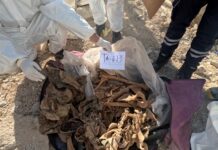
In a recent report titled “Captagon Trafficking and the Role of Europe,” the European Monitoring Centre for Drugs and Drug Addiction (EMCDDA) delves deep into the intricate web of the illicit drug trade, particularly focusing on the trafficking of captagon tablets. The report, a culmination of the European Multidisciplinary Platform Against Criminal Threats (EMPACT) Synthetic drugs and New Psychoactive Substances (NPS) operational action plan of 2022, sheds light on the significant role played by the Syrian regime in this global issue.
Captagon, primarily seized in the Middle East, is essentially amphetamine in tablet form. While Europe is not a significant consumer market for captagon, it has become a pivotal transshipment point. Most of the captagon that finds its way into Europe is rerouted to countries in the Arabian Peninsula, with Saudi Arabia being a major destination.
The report highlights that there’s evidence of captagon tablet production in the EU, especially in the Netherlands. The EU countries mainly serve as transhipment points between non-EU captagon-producing countries, such as Syria and Lebanon, and destination markets in the Arabian Peninsula. This makes Europe a significant player in the captagon trafficking network.
One of the most alarming revelations of the report is the connection of the Syrian regime to the captagon trade. Syrian and Lebanese nationals, many with ties to the Syrian regime, have been frequently implicated in many of the large captagon trafficking cases. This involvement is not limited to the production and trafficking of the drug but extends to its distribution and sale in various parts of the world.
The report suggests that apart from being responsible for organizing captagon shipments, these criminal groups, with backing from the Syrian regime, have also been involved in trafficking other drugs like cannabis resin, herbal cannabis, and even cocaine.
Given the scale of captagon shipments and its geopolitical implications, the report underscores the need for a coordinated EU security response. The involvement of the Syrian regime in the captagon trade not only poses a threat to global security but also raises questions about the regime’s funding sources and its role in the international drug trade.








